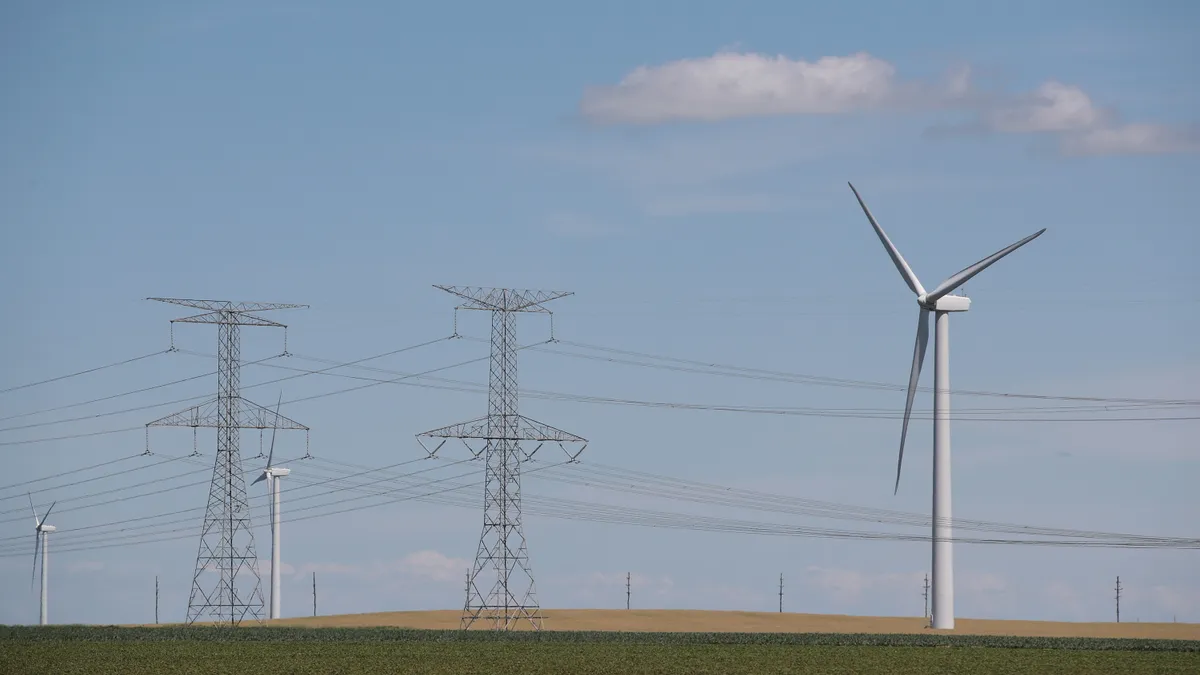Dive Brief:
-
Incumbent utilities in the Midcontinent grid operator’s footprint could build certain transmission projects without a competitive bidding process under a proposal filed Wednesday with the Federal Energy Regulatory Commission.
-
The Midcontinent Independent System Operator would assign transmission projects to incumbent utilities when at least 80% of the project’s costs come from upgrades to the existing system, a change that would facilitate a $10.4 billion Long Range Transmission Plan, or LRTP, according to the proposal, which wasn’t vetted by stakeholders.
-
Advocates for competition in the transmission sector see the proposal as part of a pattern of utilities seeking to monopolize those investments. “The MISO proposal would chip away at the eligibility of transmission projects subjected to open competition and erode associated costs savings and innovation,” Devin Hartman, R Street Institute director of energy and environmental policy, said Wednesday in an email.
Dive Insight:
MISO’s proposal centers on its LRTP Tranche 1, a set of transmission lines that could support about 53 GW of wind, solar, hybrid and stand-alone battery projects, that is slated to be voted on by the grid operator’s board on July 25. It would also apply to upcoming tranches.
Only about 21% of the estimated value of the proposed LRTP projects are subject to competition, and the MISO proposal may drop that to around 16%, according to Hartman. "We should be expanding transmission competition eligibility, not contracting it," he said, adding that R Street, a free-market group, contends that all transmission upgrades above 100 kV be subject to competition.
The LRTP plan could get bogged down if projects that primarily involve upgrading existing facilities must be put out to bid, according to MISO. Those challenges include designing, permitting and maintaining the facilities, which are typically short segments or conductor-only projects, according to MISO.
Even with the proposal, there will be “significant opportunity” for competitive transmission development in the pending buildout, according to MISO. “By promoting administrative, regulatory and economic efficiency, the proposal will allow MISO to devote its limited resources to larger competitive transmission line segments and projects, which are more likely to bring substantial benefits to MISO’s footprint,” the grid operator told FERC.
FERC approved a similar Southwest Power Pool proposal in 2014 that included an 80% cost threshold, MISO said.
“MISO has determined that the commission’s previously-approved 80/20 approach would provide a reasonable mechanism to mitigate the effects of the majority of the concerns … at least for those projects where the challenges and inefficiencies caused by these problems greatly outstrip any likely benefit to be had from conducting the competitive transmission process,” the grid operator said.
Based on a preliminary review, some “short segments” and conductor-only projects would likely be open to competitive bidding, according to MISO.
After the MISO board approves the Tranche 1 projects, the grid operator will determine which transmission facilities in the package qualify for competitive bidding, Jeremiah Doner, MISO director of cost allocation and competitive transmission, said in testimony supporting the grid operator's proposal.
The proposal strikes “an appropriate middle ground between competitive and efficiency priority,” and should allow MISO to effectively move forward with the potential Tranche 1 projects, the grid operator said.
Noting that FERC last week approved a cost allocation methodology for the Tranche 1 projects, MISO asked the commission to green-light the proposal by July 22. “This will provide maximum certainty to all parties involved in the LRTP process,” MISO said.
The timing of the proposal, weeks before the MISO board vote, and the lack of a stakeholder process to review it appears suspect to Ari Peskoe, director of Harvard Law School’s Electricity Law Initiative.
“The notion that utilities only now considered the competitive implications of LRTP, a 2-year planning process, does not pass the smell test,” Peskoe said Wednesday in an email.















